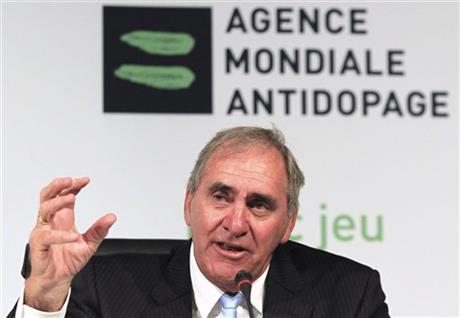
John Fahey, president of the World Anti-Doping Agency (WADA), speaks during a news conference in Johannesburg, South Africa, Tuesday, Nov. 12, 2013. Fahey says he is confident that cycling’s new leadership will set up an independent commission “within weeks” to look at the sport’s drug-stained past. Fahey says his agency has been in communication with new UCI President Brian Cookson since the Briton took over in September, and the UCI has indicated its wish to WADA “to get something going.” (AP Photo/Themba Hadebe)
Joseph Sepp Blatter
FIFA president Joseph Sepp Blatter listens during a press conference in Tehran, Iran, Thursday, Nov. 7, 2013. Blatter is saying he has urged Iranian authorities to open the gate on female football fans in Iranian stadiums. The Thursday remarks by Blatter came during a briefing in Tehran in which he said he sought Iranian decision makers including parliament speaker Ali Larijani to facilitate presence of female spectators in Iranian stadiums. The controversial issue was in the air in the conservative country over the past decades. (AP Photo/Ebrahim Noroozi)
South Africa World Anti-Doping Agency
John Fahey, president of the World Anti-Doping Agency (WADA), speaks during a news conference in Johannesburg, South Africa, Tuesday, Nov. 12, 2013. Fahey says he is confident that cycling’s new leadership will set up an independent commission “within weeks” to look at the sport’s drug-stained past. Fahey says his agency has been in communication with new UCI President Brian Cookson since the Briton took over in September, and the UCI has indicated its wish to WADA “to get something going.” (AP Photo/Themba Hadebe)
Prev
1 of 3
Next
JOHANNESBURG (AP) — World Anti-Doping Agency President John Fahey says even though it is highly unlikely that a new testing laboratory in Brazil will be ready for the World Cup next year, it’s a problem FIFA should be able to overcome.
Fahey said there would be a “transportation challenge” for the world football body to test player samples out of Brazil.
WADA revoked the accreditation of the current Brazilian lab this year and a new one is being set up, but is unlikely to be ready in time for June’s World Cup kickoff.
FIFA plans to fly samples from Brazil to Switzerland for testing, and Fahey cited an example of the IAAF transporting 40 athlete samples from a remote region in Kenya to Switzerland to show it is possible.



